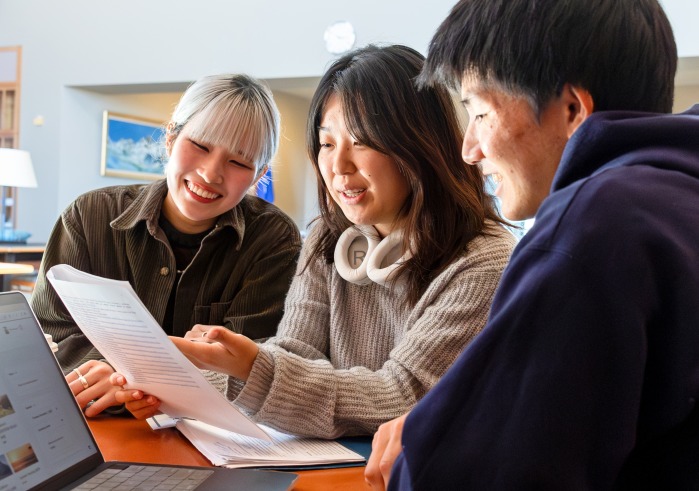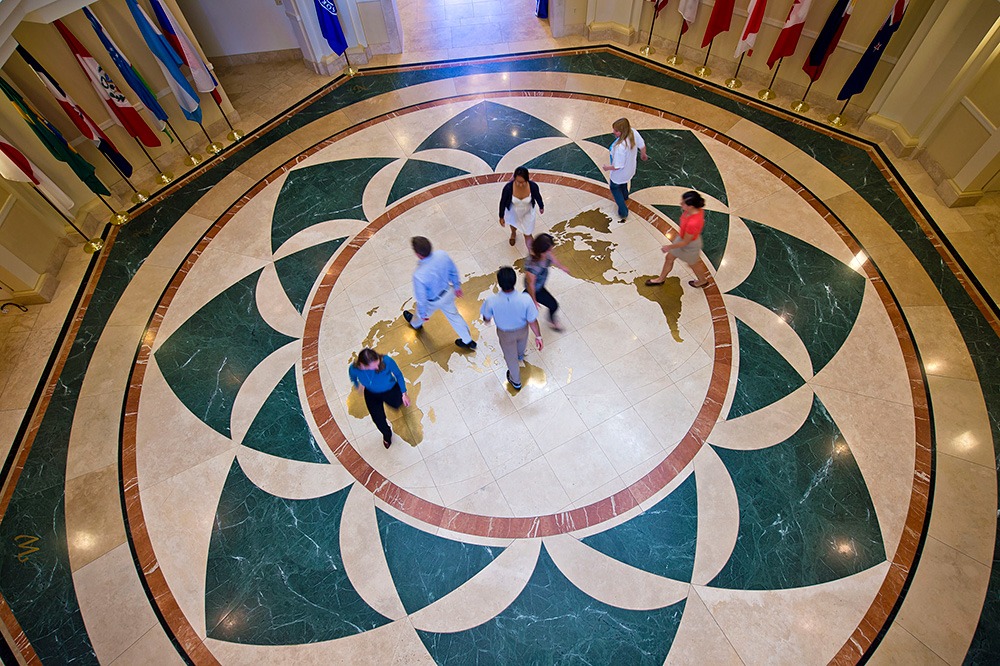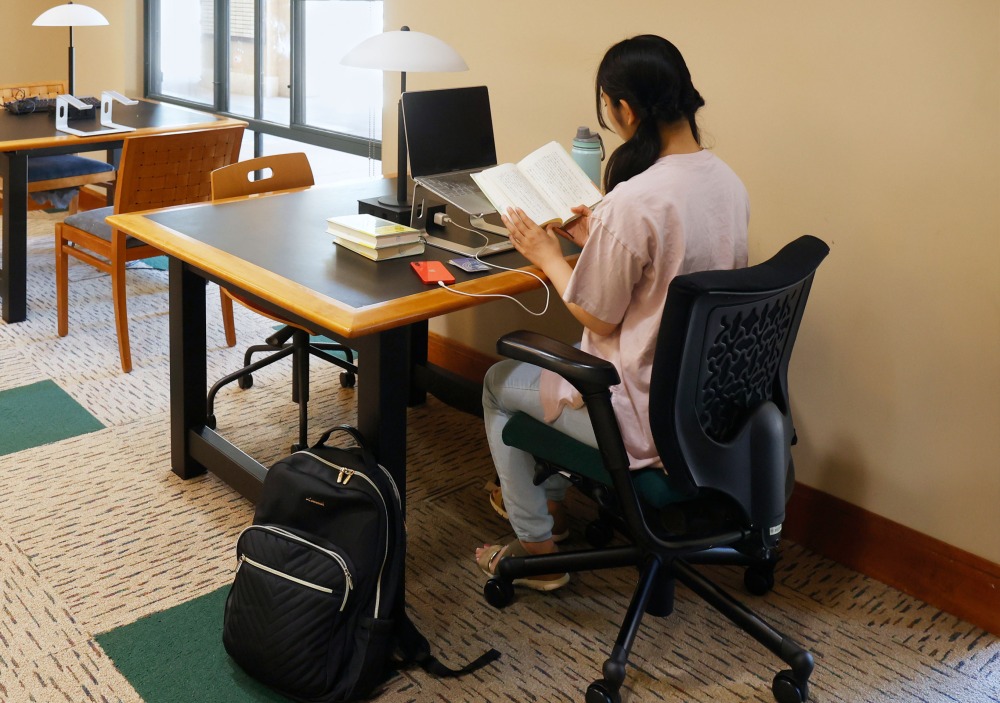Social and Behavioral Sciences: Where Theory Meets Real-World Change

“I think the students who come here want to change the world,” said Professor of Political Science Peter Burns — and as a teacher of public policy, urban politics, American government, and constitutional law within the Social and Behavioral Sciences Concentration at SUA, he’s helping them do exactly that.
While there are many paths SUA students can take to contribute to a more just and peaceful world, Burns believes the SBS Concentration offers students a critical academic foundation that helps them think about how to enact positive change.
“I think the concentration allows them to see the world as it is,” Burns said, “and change it.”
One of five concentrations students can choose while earning their B.A. in Liberal Arts at SUA, the SBS Concentration includes courses in anthropology, economics, political science, psychology, and sociology. Although these diverse fields cover a wide range of topics and research methods, scholars in the social and behavioral sciences often pursue similar fundamental questions.
“What holds us all together,” said Associate Professor of Anthropology Sarah England, “is we’re trying to understand human behavior in its social context and in all its complexity.”
England teaches a class on qualitative research methods and several different anthropology courses, some of which are cross-listed with the International Studies Concentration, such as Latin American Migration to the U.S.; Gender and Sexuality in Cross-Cultural Perspective; and Inequality, Repression, and Resistance in Central America.
The questions social scientists ask — like how individuals make economic choices, how cultural forces influence political opinion, or why discrimination exists — often benefit from an interdisciplinary approach. This is why the opportunity to take classes across different fields offers students a more well-rounded education than a traditional subject-specific major. The broad nature of the concentration allows students to develop a rich, nuanced understanding of human society and behavior.
“I chose the SBS Concentration,” said alumna Ana Schugurensky ’20, who is now pursuing a Ph.D. in political science at UC Irvine, “in an attempt to satisfy my curiosity about how the world works. Courses in psychology offered me cognitive explanations for why people think and behave in certain ways; sociology presented explanations for pervasive societal inequities; and political science taught me about the roles of governmental institutions and political participation in shaping our relationship to the state and to one another.”
A Foundation for Global Citizenship: Why the Social and Behavioral Sciences Matter
Like Schugurensky, many students choose SBS because they appreciate the clear connections between what they’re learning in the classroom and real-world issues related to the economy, politics, mental health, and cultural phenomena at home and abroad. Having an understanding of the social sciences, says Professor of Anthropology Edward Lowe, is essential to being an informed and engaged global citizen.
“The social sciences,” Lowe said, “influence almost all policy-making in the United States and many other governments in the world, particularly in democratic societies.” A background in social and behavioral sciences, he said, also helps students become critical consumers of media.
“We live in a media-saturated world where soundbites and memes dominate public conversations,” he said. “And they’re very cleverly designed to generate emotional responses.”
The social sciences, however, teach students how to evaluate the quality of the evidence, if any, that is being used to substantiate the claims they encounter daily on social media and elsewhere.
“If more people have that training,” Lowe said, “it’s like an inoculation against the nonsense that we encounter in our media-saturated environment. It also means that we’re probably going to hold ourselves and others in our world to a higher account.”
Adaptable Skills for a Contributive Life
Students in the SBS Concentration acquire versatile skills that prepare them to pursue graduate studies and fulfilling careers in a wide range of fields.
“The first thing we want students to know,” said Lowe, “is how different social scientists create their understandings of society. What are the core concepts that they use?” Students in SBS gain substantial knowledge of the theories and explanatory models that scholars use to examine aspects of human culture, including economic, psychological, and societal topics.
Teruaki Sasaki ’24, an SBS student from Tokyo, Japan, who will graduate this December, says that the SBS Concentration helped him to critically analyze scholars’ claims. “Before,” he said, “I just took whatever scholars said for granted.” His academic training, however, has helped him not to take what he reads at face value and instead examine topics from multiple perspectives in order to “fully see and understand issues.” This kind of informed, critical thinking is applicable not only to graduate studies in the social sciences, but to identifying and solving problems in the professional world, no matter what career path SBS students choose.
Another important skill students develop is how to formulate a good research question with real stakes for their field of study. They then learn how to answer the question they posed by reviewing the work of other scholars and performing original research. In the social and behavioral sciences, England said, “We take assumptions that people have about human behavior, and we challenge them with empirical evidence.”
All students concentrating in SBS take a methods class in which they learn how to collect and interpret data. There is a common misconception that research in the social and behavioral sciences must involve crunching numbers. In reality, there are multiple kinds of qualitative or quantitative evidence that researchers may use, and they collect it in a variety of ways. An economist might analyze numerical data, a psychologist may design an experiment, and an anthropologist may conduct interviews. Learning about research methods gives students a deeper understanding of how different types of evidence allow someone to make a claim about a topic and what the limitations of that evidence might be.
The third major skill set students cultivate in SBS is the ability to communicate effectively through writing papers, giving presentations, and participating in class discussions.
“With the enrollment being so small in each class,” Burns said, “students get a ton of practice writing. They are writing in almost every class.”
By completing different types of assignments, from research papers to reflective essays to policy briefs, students learn how to clearly articulate their ideas through writing — an essential skill in almost any line of work. Current student Siena Taylor ’25, who is from Pasadena, California, said honing their writing skills within the SBS Concentration has already helped them submit successful applications for internships and apply for grants for their campus affinity group, Latines Unides.
SBS students also have many opportunities to work on their presentation skills both inside and outside of the classroom. Mira Peregud ’26, an SBS student from Vancouver, Canada, turned a research paper she had written on the political and economic dynamics of her country of birth, Belarus, into a poster presentation for a conference. Presentation skills are highly applicable beyond academic settings as well. Taylor said their experience in SBS gave them the confidence to deliver presentations during their internship doing archival work for the Center Theater Group in Los Angeles.
“Because I’ve had to do presentations in class,” Taylor said, “I could present to the marketing department and say, ‘This is why you need a digital asset management system.’”
In addition to facilitating quality training and feedback on writing and presentation skills, small class sizes allow for in-depth discussions that sharpen students’ abilities to have informed and respectful conversations on difficult topics. SUA senior Sasaki said he initially found it intimidating to participate in class discussions about race and identity. However, the classes he took in SBS gave him the tools and a safe space to share his perspective.
“It’s important to have discussions,” Sasaki said. “That’s the point of going to class … I’m now ready to talk about those sensitive topics in graduate school.”
Many graduates of the SBS Concentration have built meaningful careers in highly diverse fields — a fact that Lowe does not find surprising given how widely applicable a background in the social and behavioral sciences is.
“If you’re going into marketing,” Lowe said, “that’s applied social science. Lawyers will often use social science in arguing cases. Education, health, medicine, you name it. There’s a whole range of areas of professional life that are shaped, to some degree, by social science.”
SBS concentrators have become lawyers, teachers, clinical psychologists, and public servants. They work for nonprofit organizations that advocate for affordable housing, sustainable agriculture, and women’s reproductive health. They work in education, investment banking, and the tech sector. Some have earned doctorates in their fields and now teach and conduct research at universities.
“SBS makes me want to try new things,” said Taylor, “and actually see different paths forward for myself.”
Thinking Like a Social Scientist: Seniors Flex Their Skills in Capstone Projects
The skills students develop during their time at SUA culminate in the capstone project they complete over the course of their senior year. Through the capstone, students have the opportunity to explore a research question of their choice, applying rigorous methods to answer their question and explaining their findings in a substantial piece of academic writing.
Eric Yoshimura ’25, a current SBS student from Kyoto, Japan, is working on a capstone project that will analyze how different economic variables affect the exchange rate between the Japanese yen and the U.S. dollar. He enjoys examining a topic that directly impacts his daily life and that of many of his classmates at SUA, and he is looking forward to testing out his research and writing skills along the way.
“It’s such a grateful moment for us to reflect on ourselves,” he said of the capstone process, “and see how much we have developed our skills in four years.”
Burns recommends that capstone students first formulate a question about a topic they’re passionate about and then see how they can approach their question through a social or behavioral science lens. When students generate capstone projects based on their own interests, Burns said, they’re more likely to produce high-quality, meaningful work.
The research questions SUA students tackle for their capstones often influence their academic and professional trajectories. For her capstone project, alumna Schugurensky examined Canadian newspaper editorials on the topic of universal healthcare in the years prior to the Medical Care Act of 1966. She is now directly building on this research for her doctoral dissertation at UCI.
Sasaki, who recently applied to a Ph.D. program in anthropology at the University of Johannesburg, is working on a capstone about homelessness in Japan. Because Japan has an aging population, Sasaki’s research focuses specifically on how being unhoused impacts elderly individuals, their ability to be independent, and their roles within their families as parents and grandparents.
Taylor’s capstone is inspired by their work in the Acjachemen community archives as part of a research assistantship with James Spady, associate professor of American history. The capstone is an oral history project and self-reflective ethnography of the Acjachemen, the original inhabitants of the land that eventually became Orange County and portions of neighboring counties. The oral history will be added to the community archives and included in the tribe’s petition for federal recognition. Taylor is planning on applying to graduate programs in archival studies next year.
Tess Aman ’25, from Jupiter, Florida, is currently working on a capstone about increasing accessibility to mental health practices. She is researching different therapies that individuals can try for free or at home. “The end goal,” she said, “is to create a brief guide to help introduce these therapies to greater populations and provide ways for someone to begin seeking help.” After graduation, Aman plans to gain work experience before applying to graduate programs in clinical psychology.
Apart from helping students practice the critical thinking, research, and writing skills that will serve them well throughout their careers, the capstone project gives them the opportunity to generate graduate-level work that they can feel proud of for years to come.
“I’ve read capstones,” England said, “that were as good as master’s theses in terms of the theory, the analysis, the writing, and the methods.”
“Branch Out and Make Connections”: Words of Advice for SBS Students
SUA students and faculty offered a lot of helpful insights for current or potential students in the SBS Concentration. The most prevalent piece of advice? Take classes in a variety of fields within the concentration, not just the particular subject that may interest you, and do so as early as you can.
“Don’t just think of depth,” Lowe said. “Think of breadth … Try to branch out and make connections to the perspectives of the other social sciences.”
England also emphasized the value of interdisciplinary thinking. “If you really want to understand a social issue,” she said, “you need to see how an economist would analyze it, how an anthropologist would analyze it, and so on … the more angles you use to look at a social problem, the richer your understanding of all of its different dimensions is going to be.”
Peregud, now a junior in the SBS Concentration, recommended meeting one-on-one with faculty as often as possible.
“Go to office hours,” she said, “or set up meetings with professors to get personalized advice on your interests and questions … One-on-one feedback can be a great help in improving your skills and determining your interests.” It can also help you see if you work well with a professor, she said, “which is important for picking a capstone mentor in your third year.”
SBS senior Yoshimura stressed the importance of talking to your peers within the concentration about their interests. SBS concentrators have such a wide range of perspectives, he said, that you can learn a great deal from your classmates. In a similar vein, Sasaki encouraged his fellow students to participate in class discussions.
“Don’t be afraid of speaking up in class,” he said, “because your voice is very valuable and important. Your opinion matters.”
If you’re thinking about concentrating in the social and behavioral sciences but are still not sure if this is the right area of study for you, Burns advises pursuing your passion.
“What do you love?” he said. “Do you love questions about psychology, human behavior, society, how people live, how people act, how government works, how politics works, or how the economy works?” If those questions appeal to you, Burns said, you probably belong in the SBS Concentration. And if you don’t know yet what you’re passionate about, Burns is confident that the interdisciplinary nature of education at SUA “will give you an opportunity to see where your passion is.”
There are a wide selection of courses in the SBS Concentration that offer a chance to explore what you might be interested in. For SBS alumna Schugurensky, now is an especially exciting time to dive into the social and behavioral sciences.
“The way I see it,” she said, “today’s social, economic, cultural, and political circumstances have left scholars with even more questions than answers than usual … I encourage you to take courses within SBS if you are interested in understanding how we got to this point and where we can go from here.”


